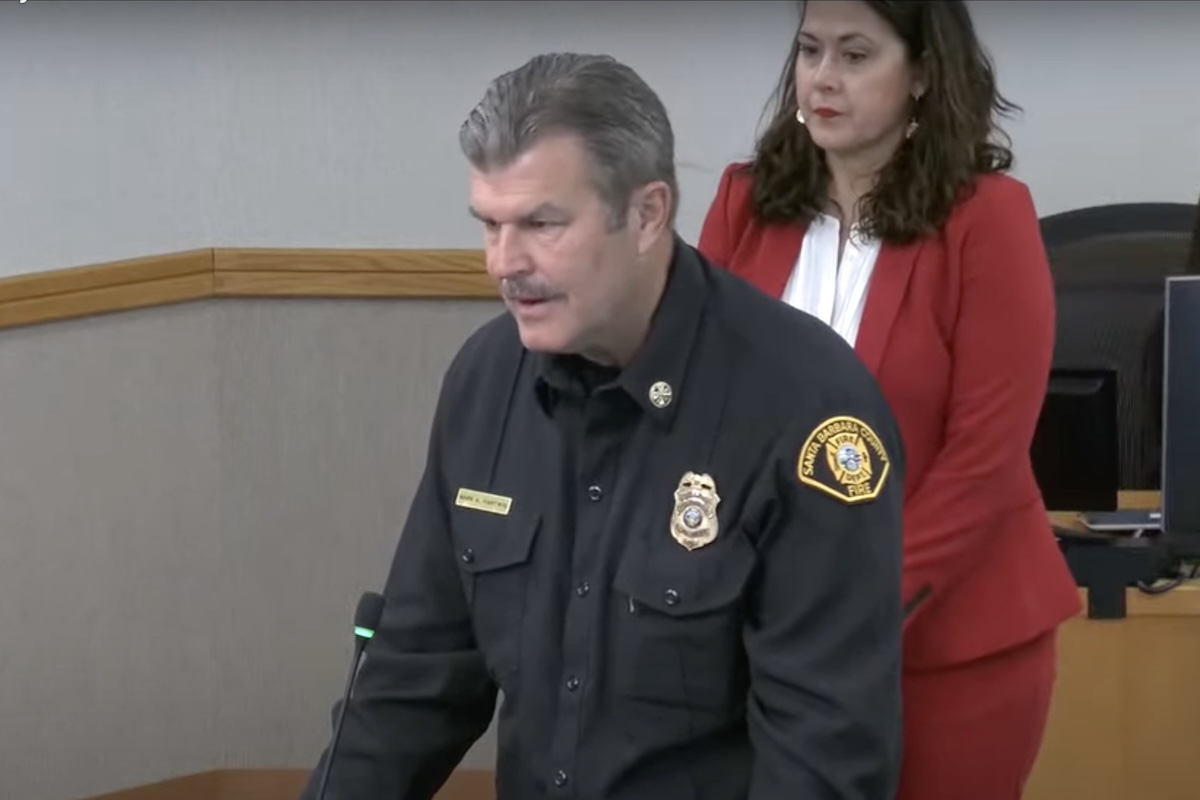Santa Barbara County Fire Chief Warns Residents to ‘Keep Your Head on the Swivel’
Fire Chief, Emergency Planning Czar Give Supervisors Sobering Earful in Response to L.A. Fires

In a briefing short on details about water pressure and water supply, but long on warnings about advance preparation and personal responsibility, the county supervisors got a sobering earful from Fire Chief Mark Hartwig and county emergency planning czar Kelly Hubbard in response to the wind-driven infernos now engulfing much of Los Angeles.
The ominous news, Hartwig noted, was that no rain is forecast anytime in the next 10 days. Winds will soften and humidity levels will increase a bit, he said, but only somewhat.
In its 100 years of existence, Hartwig said, the county fire department has learned a lot when it comes to pre-positioning resources before fires explode. Without going into detail, he said that’s exactly what his department is doing now.
“I can’t tell you we will be exactly where we need to be when the next fire hits, but I will tell you we will be close,” he said.
Fire protection, he stressed, was up to the individual as much as it was the fire departments charged with their protection.
“Keep your head on the swivel,” he warned residents.
People need to self-evacuate, he stressed. It’s not realistic or even possible, he added, for first responders to knock on every door. Homes need to be cleared of flammable brush; defensible space needs to be maintained. Firewise practices need to be observed, he said, noting that neighborhood Firewise groups are now sprouting up and intervening in cases where neighbors are either unable or unwilling to do the clearing themselves.
“Ready-Set-Go is not just a tag line,” he stressed. “If you are just getting ready when the evacuation order hits, it’s too late.”
Kelly Hubbard of the Office of Emergency Planning followed suit, detailing changes in the works for the county’s system of alerts — both via text and phone calls, adding, “I’d prefer to over-alert than under-alert,” clearly a response to previous concerns expressed about oversaturation of such notices.
She told the supervisors that both major utility companies have already shut off power at various times as a precautionary response to escalating winds and the increased risk live power lines pose in such circumstances. Residents are eligible for partial rebates from the power companies she said for mini-power packs — for phone and light charging — or even larger ones, should personal generators be needed for people who rely on medical devices for basic life functions. Both utilities offer discounted nights at hotels, she added, for those with special medical needs.
Mostly, she detailed the “Six Ps” residents should keep in mind when packing their “Go Bags.” These include people, pets, prescriptions, plastics (as in credit cards), personal computers, and pictures.
She also stressed the need to have multiple escape plans already in mind before evacuating. Most people take the same one or two routes to and from their homes. Those routes can be blocked. People need to know multiple ways in and out.
With the supervisors’ agenda choked with multiple time-consuming issues this Tuesday, there was little discussion and no questions from the supervisors. Supervisor Joan Hartmann took the moment to highlight the extent fire threats have escalated. Most major fires had occurred in what’s known as the Urban Wildland Interface, she said. The ones in Los Angeles have attacked neighborhoods in their urban core, previously considered all but unimaginable.
“We’re seeing something different,” she said. “I think this is a wakeup call. It’s not business as usual.”
Supervisor Laura Capps noted that the recent fires have sparked renewed interest in preventative options, like the undergrounding of power lines that have been deemed prohibitively expensive. Capps said the supervisors will be discussing that option in the near future.








